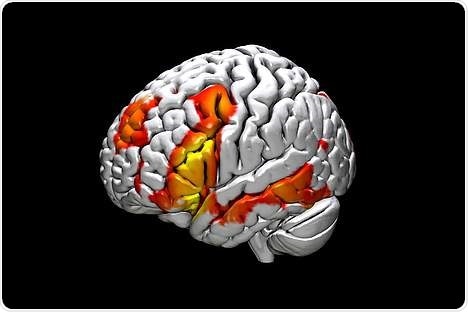Children with brain injuries are able to reorganize their language relevant areas into other, healthy brain areas and thus maintain their ability to speak. However, this is only possible to a certain extent, they still often have poorer language skills compared to healthy children. Brain areas responsible for language are apparently already determined during fetal development. These are the first central results of an interdisciplinary research cooperation at MedUni Vienna, which investigates the development of language in the brain from the unborn to the adolescent.

Representation of the language areas in the healthy child brain
An interdisciplinary team from the Department of Pediatrics and Adolescent Medicine and the Department of Biomedical Imaging and Image-guided Therapy at MedUni Vienna is investigating how the individual localization of language areas in the brain is related to the individual language abilities and how a lesion in the child's brain affects the child's language localization and language abilities.
Healthy children with better language skills are therefore more likely to use a bilateral language network linking regions in both hemispheres. The researchers, led by neurolinguist and clinical linguist Lisa Bartha-Doering from the Department of Pediatrics and Adolescent Medicine, show that in healthy children, a larger vocabulary, greater verbal flexibility, and better verbal learning are associated with more bilateral language localization.
Language areas are defined in the brain before birth
In children who had suffered a stroke, the researchers were also able to demonstrate a significant correlation between language localization and language abilities. While the age at the occurrence of the stroke, lesion size, or lesion localization had no influence on the language abilities, an atypical reorganization of the language areas was shown to be disadvantageous for the language abilities.
Bartha-Doering:
Our results to date indicate that there is a predisposition to specific language areas in humans in the early childhood, probably even before birth. Even if an injury to neuronal structures occurs very early in development, the child's brain is not fully capable of reorganizing speech-relevant areas. An atypical reorganization is accompanied by worse language skills. Here, however, there seem to be limits to the often-praised plasticity of a child's brain."
In particular, the very early functional development of relevant brain structures will now be the focus of the research team. In a FWF-KLIF project (PI: Lisa Bartha-Doering), the researchers are working on the question of the extent to which fetal MRI diagnostics can predict the later localization and development of language. Two initial publications have already been published on this subject, which show a connection between structural fetal development of temporal brain structures and later language localization.
Bartha-Doering:
The neuropediatric outpatient unit of the Children's Hospital under the direction of Rainer Seidl specializes in developmental neurological consultation using fetal imaging. We are particularly happy about the great collegial cooperation with radiology, above all Daniela Prayer, Gregor Kasprian and Georg Lang. The radiology at MedUni Vienna is world-famous especially in the field of fetal diagnostics, and the combination of highly developed radiological expertise with neurolinguistic questions is unique."
In future, the results of this research should enable more precise forecasts of further cognitive development and the early planning of targeted therapeutic strategies. The aim is to use functional imaging to predict how healthy children as well as children with neurological diseases will develop cognitively.